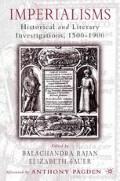Abstract
In researching imperialisms, postcolonial critics and historians have concentrated on retrieving subjected cultures from the stereotypes in which they were embedded. Scholarship on empire has been much less engaged with characterizing cultures of dominance, in part because the sheer weight of dominance has precluded consideration of its varieties. Moreover, postcolonialists tend to nourish the proposition that the nuances of exploitation matter little to the exploited. In the words of V. K. Krishna Menon, defence minister for India in the early 1960s, asking a subject people what imperialism it prefers is like asking a fish whether it would rather be fried in margarine or butter. There is enough in this quip to make distinctions between imperialisms seem a matter of scholarly rather than real importance. Yet, notwithstanding their similarities, imperialisms do differ, often substantially, and have their individual ways of articulating these differences. Each imperial nation devises its own characteristic propaganda and separates itself emphatically from other nations and empires if only to advertise its special entitlement to power. Even today the propaganda for benevolent liberal imperialisms (by scholars such as Niall Ferguson)1 demonstrates that imperialist fictions of self-justification are still alive and still being invented.
Access this chapter
Tax calculation will be finalised at checkout
Purchases are for personal use only
Preview
Unable to display preview. Download preview PDF.
Notes
Professor Niall C. Ferguson’s latest book, Empire: The Rise and Demise of the British World Order and Its Lessons for Global Power (New York: Basic Books, 2003), is a comprehensive history of how the British came to rule the world. Ferguson credits the British empire for serving as the chief promoter of progressive thought around the globe for much of the past two centuries, and he suggests that the United States has now assumed that responsibility.
David Armitage, Theories of Empire, 1450–1800 (Aldershot: Ashgate, 1998). The collection consists of 15 essays originally published between 1949 and 1995.
Anthony Pagden, Lords of all the World: Ideologies of Empire in Spain, Britain and France c. 1500—c. 1800 (New Haven: Yale University Press, 1995).
Klaus E. Knorr, British Colonial Theories, 1570–1850 (Toronto: University of Toronto Press, 1944).
Linda Gregerson challenges Benedict Anderson’s distinction between the “inherently limited and sovereign” nation and the colonial expansionary empire (The Reformation of the Subject: Spenser, Milton, and the English Protestant Epic [Cambridge: Cambridge University Press, 1995], 228). See Anderson, Imagined Communities: Reflections on the Origin and Spread of Nationalism (London: Verso, 1983), 15. On the relationship between imperialism and nationalism, most often regarded as a nineteenth-century development, see Timothy Bennan, “The National Longing for Form,” Nation and Narration , ed. Homi K. Bhabha (New York: Routledge, 1990), esp. 58–59.
Edward Said, Orientalism (New York: Pantheon Books, 1978), 75.
Among the best scholarly studies on this subject are Nabil Matar, Islam in Britain, 1558–1685 (Cambridge: Cambridge University Press, 1998); Barbara Fuchs, Mimesis and Empire: The New World, Islam and European Identities (Cambridge: Cambridge University Press, 2001); and Daniel Goffman, The Ottoman Empire and Early Modern Europe (Cambridge: Cambridge University Press, 2002). Also important is John Michael Archer’s Old Worlds: Egypt, Southwest Asia, India, and Russia in EarlyModern English Writing (Stanford: Stanford University Press, 2001); for a list ofrecent criticism of the figure of the Jew and the Moor in the early modern world, see the Introduction: “Para-Colonial Studies,” in Old Worlds 197, n. 54.
Editor information
Copyright information
© 2004 Imperialisms
About this chapter
Cite this chapter
Rajan, B., Sauer, E. (2004). Introduction: Imperialisms: Early Modern to Premodernist. In: Rajan, B., Sauer, E. (eds) Imperialisms. Palgrave Macmillan, New York. https://doi.org/10.1057/9781403980465_1
Download citation
DOI: https://doi.org/10.1057/9781403980465_1
Publisher Name: Palgrave Macmillan, New York
Print ISBN: 978-1-349-52878-3
Online ISBN: 978-1-4039-8046-5
eBook Packages: Palgrave History CollectionHistory (R0)

